|
|
|
Sort Order |
|
|
|
Items / Page
|
|
|
|
|
|
|
| Srl | Item |
| 1 |
ID:
073505


|
|
|
|
|
| Publication |
2006.
|
| Summary/Abstract |
How to prevent nuclear proliferation is once again topping the U.S. security agenda. But few decision-makers are seriously considering what a postproliferation world would look like, even though such a world would inevitably require rethinking many of the policies that the U.S. government and others now take for granted.
|
|
|
|
|
|
|
|
|
|
|
|
|
|
|
|
| 2 |
ID:
088745
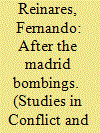

|
|
|
|
|
| Publication |
2009.
|
| Summary/Abstract |
Approaching the Madrid train bombings of 11 March 2004 from a security perspective, the occurrence of these highly lethal blasts made it evident not only a major intelligence failure, but also serious problems in the coordination between law enforcement agencies and deficiencies in international cooperation to prevent such deadly manifestations of global terrorism. As a result, governmental measures adopted in Spain immediately afterwards to reform the internal security structures and thus more adequately face the persisting risks and threats associated with that phenomenon, paid particular attention to increasing intelligence capabilities, advancing antiterrorist coordination and strengthening collaboration with relevant nations, alongside other initiatives aimed at preventing and countering al-Qaeda related terrorist activities. Overall, those measures enjoyed a high degree of legitimation among citizens
|
|
|
|
|
|
|
|
|
|
|
|
|
|
|
|
| 3 |
ID:
052395


|
|
|
|
|
| Publication |
Jul-Aug 2004.
|
| Summary/Abstract |
This piece attempts to add to the discourse on violent substate political activism by underscoring certain overlooked elements in the study of groups such as Al Qaeda as it relates to organizational paradigms. Specifically, this essay sheds light on the nature of networks in the business world and the ways in which firms utilize organization as a method of creating value. This article starts with the assumption that the end of firm organization is ultimately the maximization of innovative capacity. The conclusion of this essay finds that Al Qaeda's use of networks has not created the indestructible conglomerate many students of terrorism fear, but rather that the resort by Al Qaeda to an all-channel network was the result of poor strategy and indeterminate political goals that have robbed it of much of its effectiveness. This study uses cursory examinations of several other similar organizations to underscore the difference in strategy and firm innovation between firms considered to have high added-value and Al Qaeda.
|
|
|
|
|
|
|
|
|
|
|
|
|
|
|
|
| 4 |
ID:
189466
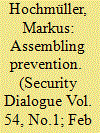

|
|
|
|
|
| Summary/Abstract |
This article examines the technopolitics of prevention in postwar Guatemala. In the 2010s, experts and policymakers shifted security governance in Central America’s most populous country towards anticipation. Against the background of rising gang violence, they implemented a set of sociopolitical and techno-material measures – based on the latest crime-control technologies, new policing strategies and urban design methods – in Guatemala’s most violent municipalities. The stated goals were to reconstruct state sovereignty and to improve public security by strengthening community resilience and inducing positive behavioural change in ‘at-risk’ citizens. Zooming in on the case of Villa Nueva, the article examines the emergence and effects of Guatemala’s ‘prevention assemblage’. It demonstrates that this technopolitical project has failed, as prevention turned into a new layer of control that shifted responsibility to local communities, further securitized urban spaces and populations, and reproduced exclusionary and repressive security governance.
|
|
|
|
|
|
|
|
|
|
|
|
|
|
|
|
| 5 |
ID:
102725
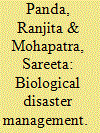

|
|
|
| 6 |
ID:
188080


|
|
|
|
|
| Summary/Abstract |
Violent radicalization is a complex process that results from multiple influences and experiences across the settings and contexts of an individual’s life. No single pathway or characteristic determines who is at risk for it. Given this understanding, no single intervention aimed at this multiply-determined problem is likely to be successful if it is implemented in isolation. Multidisciplinary team approaches are increasingly seen as holding promise in the prevention and intervention of violent radicalization in the United States and internationally. A multidisciplinary team is typically a group of professionals who are members of different fields of study (psychology, medicine, social work, etc.) who provide a specific service to an individual. Team members independently focus on the issues in which they specialize and activities of the team are coordinated with a common goal. This paper aims to extend current knowledge by addressing questions related to challenges in implementing a multidisciplinary team approach with the capacity to address violent radicalization, presenting potential solutions to these challenges as well as highlighting one multidisciplinary team, Community Connect, that successfully worked with youth identified as being at risk for violence.
|
|
|
|
|
|
|
|
|
|
|
|
|
|
|
|
| 7 |
ID:
173873
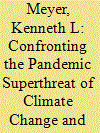

|
|
|
|
|
| Summary/Abstract |
One of the most devastating shocks to global security imaginable is a pandemic. As history helps to demonstrate, this catastrophe and its reverberations could in today's world create a scene not unlike that depicted in the Book of Revelation, when the pale horse and its rider Death sow destruction “with sword and with famine and with pestilence.” To protect our own interests and security, it is imperative that the United States take preventive actions against a potential pandemic. This article argues that one important area for mitigation is climate change interacting with the growing urbanization of the world's population. These two factors combined promise massive shocks to global security, and because of the destructive potential, it is critical that U.S. national-security professionals consider this worst-case future when developing policies and strategies. If a large-scale pandemic does occur, as many scientists believe possible, are we prepared to handle it? Have we taken the actions necessary to mitigate the worst-case outcome? This article also argues that a lead actor in prevention efforts should be the U.S. military, which has the reach and resources that others do not.
|
|
|
|
|
|
|
|
|
|
|
|
|
|
|
|
| 8 |
ID:
148244
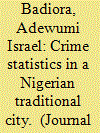

|
|
|
|
|
| Summary/Abstract |
The study identified predominant crime type and pattern of crime occurrence in Ile-Ife, Nigeria. The research used crime data, by type and location, from January 2005 to December 2010. The spatial distribution of crime types revealed that 68 cases (49%) of offences against individuals occurred in the core area of the city, 40 (29%) in the transition area and 31 (22%) in the suburban, while 184 (20%), 265 (30%) and 451 cases (50%) of offences against property occurred in the core, transition and suburban respectively. The study concluded that there was notable geographical variation in the pattern of crime locations and that this differs with regard to crime type.
|
|
|
|
|
|
|
|
|
|
|
|
|
|
|
|
| 9 |
ID:
130357


|
|
|
|
|
| Publication |
2013.
|
| Summary/Abstract |
The article discusses the developments and innovations in both cyber defence tactics and technologies in the U.S. It tackles the constant changes and dynamic war fighting environment of the country when it comes to cyber threat and exploitation. Moreover, it explores data on the changing landscape of the country's defence industry, the emergence of metadata storage technologies such as NPulse and IOVation, and aspects of cybercrime.
|
|
|
|
|
|
|
|
|
|
|
|
|
|
|
|
| 10 |
ID:
102728


|
|
|
| 11 |
ID:
146684
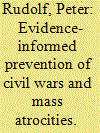

|
|
|
|
|
| Summary/Abstract |
The prevention discourse in all its forms has tended to ignore or at least downplay the epistemic problems with prevention. Forecasting political violence is not as easy as the debate on early warning often assumes. Effectively forestalling political violence and mass atrocities is much more difficult than the often used rhetoric of a ‘tool box’ implies, which creates the impression that one knows what works. An evidence-informed prevention policy needs to be aware of the limits of our knowledge, but at the same time knowledgeable of what social science research can provide – even if the results are provisional, often controversial and fraught with methodological problems.
|
|
|
|
|
|
|
|
|
|
|
|
|
|
|
|
| 12 |
ID:
074761
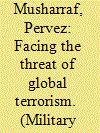

|
|
|
| 13 |
ID:
074772
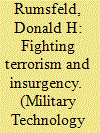

|
|
|
| 14 |
ID:
167405
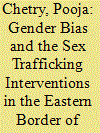

|
|
|
|
|
| Summary/Abstract |
The present article looks at gender bias and sex trafficking interventions in the eastern border of India–Nepal. It attempts to understand the socio-economic conditions and other influencing factors that circumscribe a woman’s migration. It documents the interventions by anti-trafficking networks and explores the experience of intercepted women. It attempts to show how interception methods as techniques of intervention to combat trafficking in persons are gender biased. Interception, as a primary method of intervention, is used by anti-trafficking organisations to prevent the occurrence of human trafficking cases in its origin/source country. On suspicion, a woman or a girl crossing the border alone or in all-female groups is stopped and intercepted by the anti-trafficking activists on the ground of her being a potential victim of sex trafficking. Such interception generally takes place within 3 km radius of the border of Panitanki, India, to Kakarbitta, Nepal in order to prevent the unsafe and illegal migration of girls/women. The cross-questioning method is used to extract information and validation about her identity and travel. This article, therefore, examines interception methods as techniques of intervention to combat trafficking in persons. It shows how this intervention method in certain aspect is patriarchal in its form. It reinforces the patriarchal belief of women’s vulnerability in the absence of male authority leading to discreet dangers.
|
|
|
|
|
|
|
|
|
|
|
|
|
|
|
|
| 15 |
ID:
081067
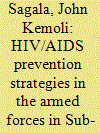

|
|
|
|
|
| Publication |
2008.
|
| Summary/Abstract |
The objective of this study is to highlight and review literature and current practices on HIV/AIDS prevention and education in African militaries. It examines the potential implications of HIV/AIDS on military effectiveness; the historical link between soldiers, war, and infectious diseases; and the problem of HIV/AIDS and African military forces. The study also reviews literature on worldwide military HIV prevention and education programs, including studies conducted in Africa. It highlights various strategies put in place by African militaries and the contributions of the U.S. Department of Defense HIV/AIDS Prevention Program and UNAIDS-Department of Peacekeeping Operations. These agencies supplement the efforts of African governments in implementing effective military HIV prevention, education, and surveillance programs. The study concludes with calls for further research on HIV/AIDS prevention strategies and African militaries.
|
|
|
|
|
|
|
|
|
|
|
|
|
|
|
|
| 16 |
ID:
099927


|
|
|
|
|
| Publication |
London, Routledge, 2007.
|
| Description |
xviii, 285p.
|
| Standard Number |
9780415400732, hbk
|
|
|
|
|
|
|
|
|
|
|
|
Copies: C:1/I:0,R:0,Q:0
Circulation
| Accession# | Call# | Current Location | Status | Policy | Location |
| 055449 | 363.32516/ALD 055449 | Main | On Shelf | General | |
|
|
|
|
| 17 |
ID:
052397
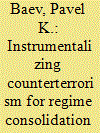

|
|
|
|
|
| Publication |
Jul-Aug 2004.
|
| Summary/Abstract |
Since the late 1990s, Russia has been among the countries most painfully affected by terrorism and President Putin has shown little doubt and even much enthusiasm in joining the U.S.-led "war" against terrorism. Intertwined as they are, counterterrorism and Chechnya are still significantly different matters in Russian security policy, and this article aims at examining how the struggle against terrorism shapes essential features of Russia's foreign and domestic policies during Putin's first presidency. Internally, the struggle against terrorism provides for a sufficient mobilization of the dysfunctional society around the "mutant" regime that has consolidated its control over mid-term political agenda. Internationally, high-profile counterterrorism strategy has helped Russia to secure for itself a more prominent role than the sheer size of its "assets" would justify. This war is fundamentally not about victory; it is about many "collateral" benefits for the regime that Putin is presiding over.
|
|
|
|
|
|
|
|
|
|
|
|
|
|
|
|
| 18 |
ID:
073794
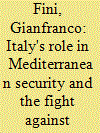

|
|
|
|
|
| Publication |
2006.
|
| Summary/Abstract |
Creating an area of political stability and security in the Mediterranean has become one of the highest priorities of Italian and European Union foreign policy, at both the bilateral and multilateral levels. Particularly important in this connection is Italy's participation in the fight against international terrorism and in regional peace and stabilization processes. Also important are its significant military contributions to operations led by the United Nations and other multilateral organizations.
|
|
|
|
|
|
|
|
|
|
|
|
|
|
|
|
| 19 |
ID:
129375
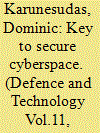

|
|
|
|
|
| Publication |
2012.
|
| Summary/Abstract |
Securing cyberspace is a global challenge one that cannot be solved by a single enterprises or country alone, though this can be achieved by bringing together government and corporate partners to protect the digital infrastructure. Cyberspace as an independent theatre of war is about attacks that compromise the capability to use these facilities: they cannot be prevented by the security services in isolation.
|
|
|
|
|
|
|
|
|
|
|
|
|
|
|
|
| 20 |
ID:
119509


|
|
|
|
|
| Publication |
2013.
|
| Summary/Abstract |
As in other countries of Central Asia, HIV infections in Kyrgyzstan have increased steeply in recent years, driven by factors such as the sharing of drug paraphernalia among injecting drug users, sex work and other risky sex behaviours, prison settings and infections acquired in hospitals. In contrast to its neighbours, Kyrgyzstan has long been considered a regional pioneer in its response to the HIV/AIDS epidemic, displaying political will and strong leadership, a timely response, and a multi-sectoral approach to tackle the disease. Yet this progress has become increasingly difficult to sustain in recent years, as it has been undermined by political and social instability, the reorganization of the Country Coordinating Committee to fight HIV/AIDS, Tuberculosis and Malaria, the lack of unified mechanisms for data collection, monitoring and evaluation, a high rate of turnover of senior and mid-level staff, stigma and discrimination faced by those most at risk, and heavy dependence on external donors.
|
|
|
|
|
|
|
|
|
|
|
|
|
|
|
|
|
|
|
|
|